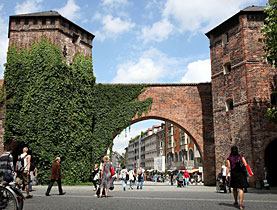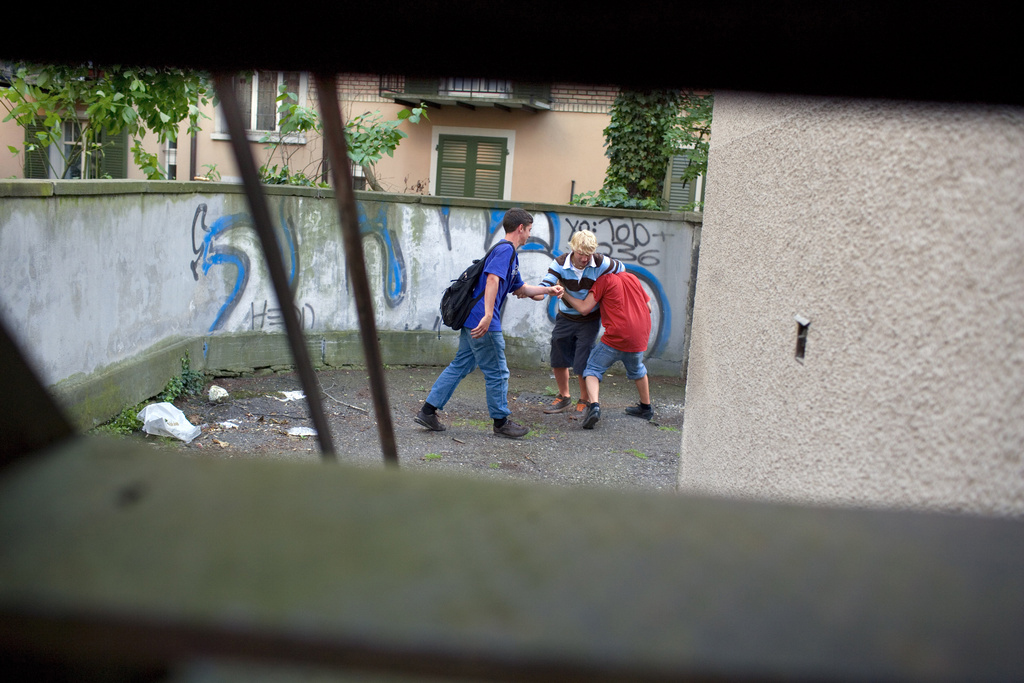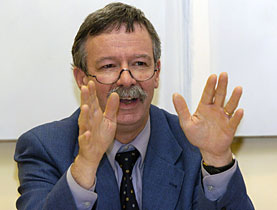Assault by Swiss students provokes outrage

Heated reactions and accusations continue to fly – in Switzerland and Germany – after a series of vicious attacks in Munich by three Swiss students on a school trip.
Many people, angered by what they perceive as “soft justice” and “mollycoddling” in Switzerland, want the perpetrators to be made to pay for their crimes in Germany.
On June 30 the 16-year-old students from Küsnacht, canton Zurich, attacked five people – one of whom was disabled – within the space of half an hour.
One 46-year-old man was almost beaten to death and is still receiving hospital treatment for multiple head fractures.
The students, two Swiss and one Slovenian, had all been drinking – although they had less than one per mil alcohol in their system (roughly three drinks) – and smoking hash. They are currently being held in a remand centre in Munich.
The German newspaper Die Zeit described the incident as alarming because the only motive had been the “pleasure of beating someone up”.
The public prosecutor, Laurent Lafleur, described the case as “a sort of rampage – a bloody folly, thankfully without guns”.
The head of Munich’s homicide division also said he was outraged by the brutality of the Swiss students, all of whom had previous convictions in Switzerland.
They are now set to be tried for attempted murder and face, in Germany, ten years in prison. In Switzerland the same crime would result in a prison sentence of up to only four years.
“Soft justice”
The Swiss justice ministry has said it could imagine the students serving their punishment in Switzerland, and were the sentence to be higher than the maximum legislated for in Swiss law, it would be reduced. For this reason the ministry is not ruling out that Germany will reject a transfer.
Rudolf Egg, head of Germany’s criminological central office in Wiesbaden, called in the German news magazine Focus for harsh measures when dealing with violent young offenders. Unprovoked attacks, he said, had developed into a sort of fashion and could only be contained with the very clear punishment of the culprits.
This opinion is shared by many in both Germany and Switzerland. Attempted murder is the correct charge, according to one Focus reader, who added that the offenders were known to the Swiss authorities “but were ‘condemned’ to nothing more than social work. Clearly soft justice still exists over there”.
“Whatever will the justice authorities think of next?” wondered one reader on the website of German news magazine Stern. “Anti-aggression training or releasing them on parole with a slapped wrist? It would be good if people realised that society should and must protect itself against such monsters. Off to prison with them and then preventive detention.”
Deportation?
More nuanced views were few and far between.
Lengthy sentences might satisfy one’s desire for revenge, wrote one Stern reader, “but I still don’t believe they’ll change anything”.
“I can’t put myself in the three students’ shoes as such an act is unimaginable for ‘normal’ people,” said another. “But I think to throw all our civilising achievements out of the window would simply be the wrong response.”
swissinfo.ch readers have also been quick to have their say. “Never let them back into Switzerland, ” said one. “Let them spend ten years in a German prison and then deport them.”
Someone else believed Switzerland should follow Germany’s example, pointing to the “trifling” four-year Swiss sentence.
“These criminals should serve their sentence in Germany – hopefully ten years inside – because in Switzerland people like this just get mollycoddled.”
Transparency in schools
Following the events in Munich, the umbrella organisation for Swiss teachers is demanding full transparency concerning students’ previous convictions.
An obligation to report such convictions to the authorities is essential for the safety of all, it said, rejecting concerns of the Swiss association for youth criminal justice that this could lead to hate campaigns.
The Swiss Conference of Cantonal Directors of Education also called for the obligatory registering of previous convictions.
However, Dieter Hebeisen, president of the association for youth criminal justice, spoke out against reporting every assault or injury at school, since such a move would give such incidents publicity.
Jean-Michel Berthoud, swissinfo.ch (translated from German by Thomas Stephens)
Up to 50,000 teenagers in Switzerland become victims of robbery every year.
An estimated 30,000 teenagers suffer injuries as a result of violence and have to consult a doctor.
Experts estimated that 100,000 people aged 12-17 suffered injuries from physical aggression without a weapon.
Some 35,000 teenagers become victims of sexual violence.
An estimated 300,000 suffer from bullying, harassment and intimidation.
According to a Federal Police Office report, there are around 500 young serious and repeat offenders in Switzerland.
Most are young men with immigration backgrounds – most commonly from the Balkans and Turkey – who often join ethnically mixed gangs. They have difficult relationships with their family, school, work and drugs.
In French-speaking Switzerland, police also talk of problems with people from north Africa and other isolated countries in Africa.
Female gangs appear to be exceptional. One area that is not disputed by experts is the qualitative shift in youth criminality in recent years – above all the increased viciousness of attacks and the increased intensity of delinquency by individuals.

In compliance with the JTI standards
More: SWI swissinfo.ch certified by the Journalism Trust Initiative













You can find an overview of ongoing debates with our journalists here . Please join us!
If you want to start a conversation about a topic raised in this article or want to report factual errors, email us at english@swissinfo.ch.